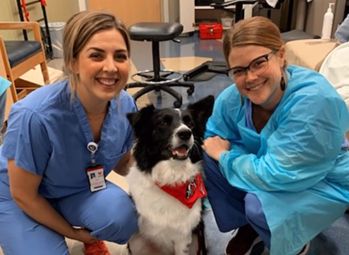My son Logan is a 5th grader. Logan is a very bright child who loves Boy Scouts and video games. Logan also has Asperger’s Syndrome which is a form of autism. I always knew something just wasn’t right. He rarely smiled as a toddler and was very sensitive to loud sounds and strong smells. His friends were stuffed animals as he never got along with his peers. School was a struggle as he just didn’t understand how to relate to others in his class. Academically, he had no problems with math and science. Reading however was a struggle. He didn’t enjoy reading; even resisted reading out loud as he had enunciation difficulties. He was tired of everyone correcting his speech. And then Logan met Mrs. Holamon’s therapy dog Gibbs. Gibbs’ calm demeanor helped Logan to slow down and enjoy books. Gibbs doesn’t care if he doesn’t pronounce a word correctly or pauses to look at a picture. Logan was excited about going to school on the days that Gibbs and the other READ dogs would be visiting. Being excited about going to school? That was a first for him. They have a program at his school which tracks the books he reads, the number of words, and grades his comprehension. Before Logan met Gibbs, he wasn’t passing most of the quizzes he took and recorded no more than 400,000 words in a single school year. This year he has passed every quiz with a 90% average score, and has read over 1,000,000 words. Better yet, on his last birthday, he asked not for a video game but a book series as his gift. Emotionally, Gibbs has created a profound change in Logan. I recall one time that Logan was reading a Clifford book to Gibbs and skipped a couple of pages because Clifford was sad and Logan didn’t want it to hurt Gibbs feelings. Expressing empathy for another living creature is a difficult skill for someone with autism. Time with Gibbs allows Logan to practice his social skills – no judgment, just acceptance. His self-esteem has improved and he is a happier child. I am so thankful for Mrs. Holamon and Gibbs – a truly remarkable team that have changed Logan’s life for the better.
R.E.A.D. Team Teri Holamon & Gibbs
Garland, TX

